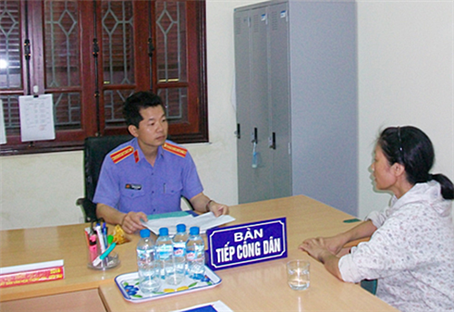If the time limit for handling the complaint is exceeded or a resolution decision is not issued, the person authorized to resolve the complaint shall be subject to disciplinary action.
This is a new point in the draft Decree (submitted by the Government Inspectorate of Vietnam to the Government of Vietnam) replacing Decree No. 75 of the Government of Vietnam on the implementation of the 2011 Law on Complaints.
According to Article 5 of the 2011 Law on Complaints, agencies, organizations, and individuals within the scope of their functions, duties, and authority are responsible for promptly and lawfully resolving complaints, strictly handling violators; taking necessary measures to prevent potential damage; ensuring that complaint resolution decisions are strictly implemented and held accountable before the law for their decisions.

Illustrative Image (source: internet)
In practice, there are many violations of the law by complaint resolution officers, but handling is difficult due to the lack of stipulated sanctions in the law.
Another issue is the resolution decision of the second-level authority for initial complaints that exceed the time limit without resolution. In this case, the complainant sends a petition to the second-level authority, clearly stating the reason and enclosing relevant documents regarding the complaint.
The draft Decree stipulates that the second-level authority will not handle the resolution but will issue a document requesting the first-level authority to resolve it. The request document must clearly state the requirements for resolution, the responsibility to report on the resolution result, and explain the delay to the competent authority. The transfer of the case to the first-level authority is communicated to the complainant and the accused.
In reality, unresolved complaints affect the exercise of citizens' rights. Therefore, when a competent authority does not resolve a complaint, citizens must send their petition to a higher authority. If the superior authority also does not consider it, citizens do not know where to seek resolution for their complaint. This leads to prolonged, intense grievances and complaints, reducing public trust in state administrative agencies.
Article 40 (applying disciplinary action to the competent authority resolving complaints) of the draft Decree adds regulations on handling violations, specifying principles for dealing with the competent authority, those assigned to verify, those organizing execution, and complainants when these entities violate the law.
The draft details sanctions for the competent authority resolving complaints, including reprimand, warning, salary reduction, demotion, dismissal, and forced resignation when they violate such as: Exceeding the time limit without initiating resolution, not issuing a resolution decision, covering for the complainant, creating excessive difficulties, not organizing dialogue, threatening revenge, or suppressing the complainant.
Source: Dai Hung - plo.vn
 Article table of contents
Article table of contents





.Medium.png)
.Medium.png)
.Medium.png)
.Medium.png)
